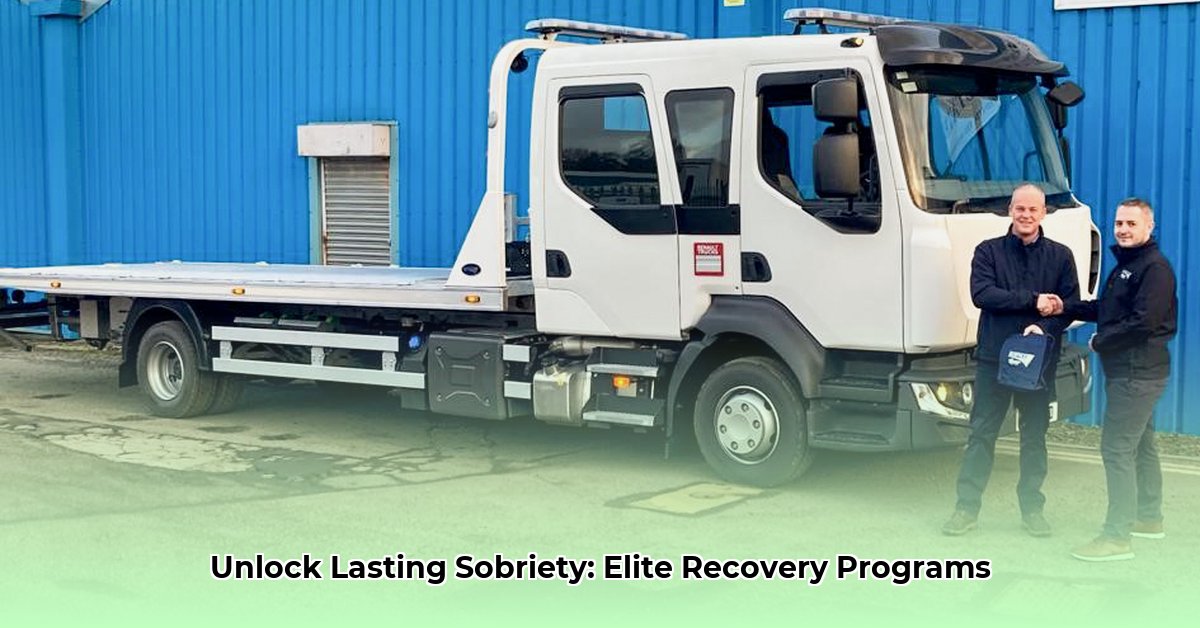Recovering from addiction is a deeply personal journey, and what works for one person might not work for another. For those with the resources and a need for a more intensive, personalized approach, “elite recovery” programs offer a unique path. This article explores the world of high-end addiction treatment – examining what it entails, who it’s best suited for, how it compares to traditional options, and exploring the crucial role of long-term support. Think of it as a comprehensive guide to understanding elite recovery and whether it might be the right fit for you or a loved one.
Elite Recovery: A Path to Lasting Sobriety Through Personalized Care?
Elite recovery programs represent a high-end approach to addiction treatment, offering a personalized and often luxurious experience. But what does that actually mean, and is it the right choice for everyone seeking a path towards addiction recovery and sobriety? Let’s delve into the details of customized addiction recovery.
Understanding Elite Recovery: More Than Just a Luxurious Rehab Environment
Elite recovery is a highly individualized treatment approach, meticulously tailored to each client’s specific needs and circumstances. It goes beyond just addressing the addiction itself, focusing on rebuilding a person’s life holistically, encompassing mental, physical, and emotional well-being. Often provided in upscale, private settings, these programs offer an intensive, one-on-one experience not typically found in standard rehab facilities. Elite recovery focuses on personalized attention, confidentiality, and a comprehensive therapeutic approach. The goal is to address the root causes of addiction, develop coping mechanisms, and foster long-term sobriety through individualized care.
Who Could Benefit from Elite Recovery and Personalized Rehab Programs?
Elite recovery programs typically cater to individuals with specific needs and resources. They often include high-profile individuals who prioritize privacy, busy executives needing discreet treatment, or professionals requiring specialized support to return to their demanding lifestyles. These programs attract those who can afford a more comprehensive and holistic approach, encompassing not just addiction treatment but also life coaching, career guidance, and addressing underlying mental health issues. Those struggling with co-occurring disorders, such as anxiety or depression, may also find elite programs beneficial due to the intensive, individualized therapy offered. The level of personalized attention and tailored treatment plans can be particularly helpful for individuals who have not found success in traditional rehab settings.
Treatment Methods in Elite Recovery: A Multifaceted Approach to Healing
Elite recovery centers often employ a holistic philosophy, combining various evidence-based therapies with complementary practices. Instead of a “one-size-fits-all” approach, these programs typically offer a personalized blend of proven methods. You’ll likely encounter Cognitive Behavioral Therapy (CBT), which helps you identify and change negative thought patterns and behaviors; Dialectical Behavior Therapy (DBT), focusing on emotional regulation and distress tolerance; and possibly medication-assisted treatment (MAT), using medication to manage withdrawal symptoms and cravings. Many programs integrate holistic therapies like yoga, meditation, acupuncture, and nutritional counseling to promote overall well-being and a healthier lifestyle. The aim is to create a comprehensive strategy for lasting sobriety. Furthermore, dual diagnosis treatment is a cornerstone, addressing any underlying mental health conditions that may contribute to addiction.
The Human Element: Recovery as a Personal Journey of Self-Discovery
Recovery from addiction isn’t just about medical interventions; it’s an intensely personal journey of self-discovery and healing. Elite recovery programs often acknowledge this human element, creating supportive and nurturing environments conducive to personal growth. Many successful programs incorporate trauma-informed therapy, art therapy, equine therapy, and other experiential modalities to facilitate emotional processing and healing. Individualized life coaching is also a common feature, assisting clients in navigating the challenges of rebuilding their lives after treatment, setting goals, and establishing healthy routines. By focusing on the individual’s unique experiences and needs, elite recovery programs aim to empower clients to reclaim their lives and build a fulfilling future.
Ethical Considerations and the Cost Barrier in Addiction Recovery
The high cost of elite recovery raises critical ethical questions about access and equity. This disparity in affordability creates a two-tiered system, where only those with substantial financial resources can access these specialized programs. This naturally leads to concerns about fairness and equal opportunity. The regulatory landscape also plays a significant role, with questions around insurance coverage, licensing, and transparency in pricing deserving careful consideration. Efforts are needed to advocate for policies that promote equitable access to addiction treatment, regardless of socioeconomic status. Telehealth options and community-based programs can help bridge the gap in access to care.
Comparing Elite Recovery to Other Treatment Options: Affordable Addiction Treatment
How does elite recovery stack up against standard treatment programs? While elite programs offer premium amenities, personalized attention, and a wider array of resources, traditional treatment models may provide equally effective therapies for a significantly lower cost. Traditional outpatient programs, support groups, and community mental health centers can be valuable resources for those seeking affordable care. The choice ultimately depends on individual circumstances, needs, and financial resources. A careful assessment of your circumstances and a conversation with your healthcare provider are crucial in making an informed decision. Don’t rule out effective and affordable alternatives, especially when considering the potential for long-term recovery.
Relapse Prevention and Ongoing Support: A Commitment to Long-Term Sobriety
Completing a treatment program is just the beginning. Elite recovery often emphasizes relapse prevention and long-term support to help maintain sobriety. This may include ongoing therapy, support groups, regular check-ins with medical professionals, and life skills training to help clients navigate potential triggers and maintain a healthy lifestyle. Aftercare planning is crucial, providing a roadmap for continued recovery after completing the program. The emphasis isn’t on a single point of completion but on fostering continual personal development and ongoing support to navigate the path to sustained recovery. This continuous focus on wellness is a key differentiator, as evidenced by the lower relapse rates associated with comprehensive aftercare programs.
Is Elite Recovery Right for You? A Personal Decision on Your Recovery Journey
Choosing the right path to recovery is a highly personal decision. Weigh the pros and cons carefully, honestly assess your financial situation, and consult with healthcare professionals to determine the best approach for your needs. Explore all available options – effective and affordable programs exist and may be equally suitable. Consider your individual needs, preferences, and support system when making a decision. Remember, lasting sobriety is achievable through various avenues. The most important aspect is finding a program that fits your individual needs and resources, providing the support you need to achieve your recovery goals.
How to Choose the Right Addiction Treatment Center for Co-occurring Disorders and Mental Health Issues
Key Takeaways:
- Personalized treatment plans are crucial for effective addiction recovery and addressing co-occurring mental health issues.
- Evidence-based practices and qualified staff are essential components of a successful substance abuse treatment program.
- Accreditation and licensing verify facility quality, safety, and adherence to industry best practices.
- Addressing co-occurring mental health disorders is vital for holistic healing, as addiction rarely exists in isolation.
- Financial considerations and insurance coverage should be carefully evaluated to ensure treatment accessibility.
- Long-term support and relapse prevention strategies are vital for lasting sobriety, as recovery is an ongoing process.
Understanding Your Needs: The First Step in Finding the Right Treatment
Before you even begin searching, understanding your specific needs is paramount. What kind of addiction are you dealing with? Are there any additional mental health challenges, such as anxiety, depression, or trauma? Identifying these co-occurring disorders is critical. Many centers specialize in integrated treatment; finding one that addresses both your substance abuse and mental health needs is key. Consider undergoing a comprehensive assessment by a qualified mental health professional to gain a clear understanding of your needs. Don’t underestimate the importance of this step. It’s the foundation for successful recovery.
Evaluating Treatment Options: What to Look For in an Addiction Center
Your search for the right treatment center should be thorough and discerning. What should you be looking for? Several key factors come into play when selecting a suitable addiction treatment center:
- Accreditation & Licensing: Look for facilities accredited by organizations like CARF or The Joint Commission. These accreditations show a commitment to quality and adherence to best practices. Licensing ensures they meet state regulations. Verify credentials through state licensing boards or professional organizations.
- Evidence-Based Practices: Many treatment facilities offer evidence-based therapies like Cognitive Behavioral Therapy (CBT) or Dialectical Behavior Therapy (DBT). These approaches have a proven track record. Inquire about the specific therapies they utilize and their success rates. Research studies supporting the effectiveness of the therapies offered.
- Staff Qualifications: The expertise of the treatment team is crucial. Are the therapists, counselors, and medical professionals properly trained and experienced? Research their credentials and look for positive testimonials. Look for board-certified psychiatrists, licensed therapists, and certified addiction counselors.
- Comprehensive Programs: How to Choose the Right Addiction Treatment Center for Co-occurring Disorders often means finding a program designed to address both substance abuse and mental health issues simultaneously. Integrated treatment models are most effective. Ensure that the program provides comprehensive assessment, individual therapy, group therapy, medication management (if needed), and aftercare planning.
- Amenities and Support: While not the most defining factor, consider factors like comfortable accommodations, nutritious meals, and access to support groups post-treatment. These elements can positively impact your recovery experience. Consider amenities that promote wellness, such as fitness facilities, yoga studios, or outdoor spaces.
The Financial Side of Recovery and Insurance Coverage
Let’s be frank: addiction treatment can be expensive. Healthcare insurance coverage varies widely. Clarify how much treatment will cost before starting. Inquire about payment plans, financial aid options, or insurance coverage. Contact your insurance provider to understand your coverage benefits, including deductibles, co-pays, and out
- Borosilicate Glass Containers Offer Superior Food Storage and Meal Prep - January 20, 2026
- Glass Lid Storage Containers Keep Food Fresh and Safe - January 19, 2026
- Borosilicate Glass Storage Delivers Durability and Safety for Meals - January 18, 2026










